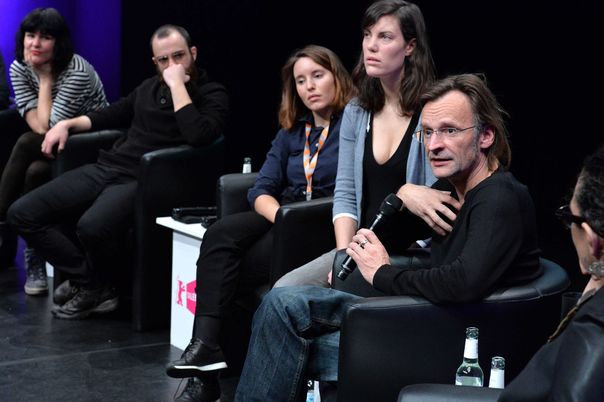Depicting the Refugee Crisis
Rasha Hosny of the 2016 Berlinale Talent Press reports from the panel No Time to Remember: Films on the Move.

The panel No Time to Remember: Films on the Move.
“It is hard to film these crises in cold blood as if it is a calm and ordinary situation”, said German filmmaker Philip Scheffner, one of the participants in the “No Time to Remember: Films on the Move” panel, one of the Berlinale Talents 2016 events. Moderated by Rasha Salti, the discussion focused on the role of both narrative and documentary filmmakers in depicting the refugee crisis around the world.
Scheffner’s phrase reflects one point of view on these filmmakers: to refuse filming with sentimentality. On the other hand, he considered his films to be about looking and observing: “As a refugee, you look at certain points to find the horizon and say the future is over there on the other side. But it could be the border also.”
Avo Kapealian, the director of HOUSES WITHOUT DOORS, filmed his documentary about the daily routine of his Armenian neighborhood in Syria from his balcony, showing how war affected people’s everyday activities. “When I was a child, there was a very big book in my house about what happened to the Armenians, it was full of pictures, and it made me wonder how somebody can capture these photos without thinking about doing something else at that very special moment. That leads me to think about documentaries and how they could be effective in such situations,” Kapealian said. The personal experience was Kapealian’s approach in making his documentary.
Most of the participants have experienced migration and displacement, such as Khalid Abdel Wahed, who was raised in Syria and went to the United States for one year. His short film SLOT IN A MEMORY is about two Palestinian and two Syrian children playing on a swing as bombs explode outside their refugee camp in Lebanon. The camp once only served Palestinians but now is also receiving refugees from Syria. “Children in this camp have a shared memory even in different political situations,” Khalid said, suggesting that politics leads history to repeat itself.

